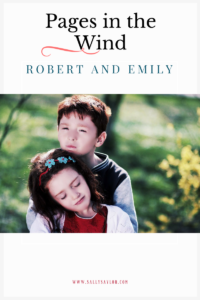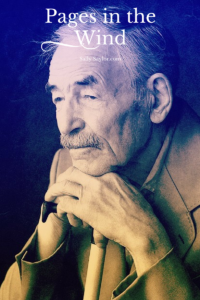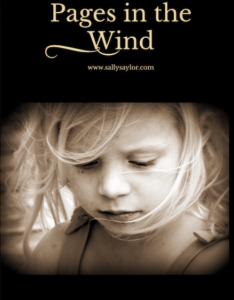Reid- A Fearless Boy and Adult Hero

Pages in the Wind deals with some difficult topics but the story has a lot of heart and it has it’s heroes. Quite a few actually. There’s the doctor, Robert, Pudge, and her love, Reid. Emily falls in love early, and the relationship is a deep one in spite of the early start. Reid is everything that Emily isn’t: fearless, confident, cocky, and at times intense. But he loves Emily and her fears that he’ll drop her as his best friend are not true. He’s exactly what he portrays and is a wonderful character in the book. This is an early passage. Reid is a prankster and gets them both in a heap of trouble. When Emily objects, he becomes offended and accuses her of not wanting to be his friend anymore. Emily convinces him that she would never feel that way. Her inner dialogue reaches far beyond her reassuring words.
Once the prank faded, all I saw was my fearless Reid. I agreed with Mr. Hemet’s lecture about the danger of putting a live snake in his house, but his warning to stay away from Reid was wrong. Wrong for me. I didn’t feel jeopardized by Reid, I felt protected. I believed someday the fearless boy would become an adult hero. If my life were threatened, he would be the one to save me.

 We all need a place to feel safe. For most of us, it’s our home. After a lousy day at work or a dismal day at school, home is a beacon. But what if home doesn’t offer safety? In this passage from Pages in the Wind, eight-year old Emily, talks about her safe place – Grandma’s house:
We all need a place to feel safe. For most of us, it’s our home. After a lousy day at work or a dismal day at school, home is a beacon. But what if home doesn’t offer safety? In this passage from Pages in the Wind, eight-year old Emily, talks about her safe place – Grandma’s house: I love the sibling relationship between Emily and Robert in Pages in the Wind. I think it’s especially important in an intense book. We need someone to count on. In this excerpt, the tender relationship is defined:
I love the sibling relationship between Emily and Robert in Pages in the Wind. I think it’s especially important in an intense book. We need someone to count on. In this excerpt, the tender relationship is defined: She’s not a villain. She’s not even mean. Claire doesn’t neglect her duties. She educates her children and gives them cultural advantages. She decorates her daughter’s bedroom with beautiful French decor. She studies the teen magazines to make sure her child is dressed in the latest trends. But…you won’t love her. You probably won’t even like her. She’s Claire in Pages in the Wind.
She’s not a villain. She’s not even mean. Claire doesn’t neglect her duties. She educates her children and gives them cultural advantages. She decorates her daughter’s bedroom with beautiful French decor. She studies the teen magazines to make sure her child is dressed in the latest trends. But…you won’t love her. You probably won’t even like her. She’s Claire in Pages in the Wind.


